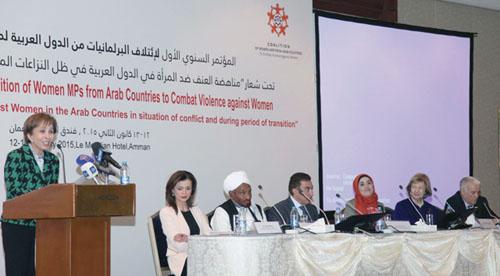You are here
Arab women MPs discuss efforts needed to combat gender violence
By Laila Azzeh - Jan 13,2015 - Last updated at Jan 13,2015

AMMAN — Arab Day for Combating Violence against Women was launched on Monday in a bid to bolster regional efforts to eliminate violence and all forms of discrimination against women.
The launch was part of activities of the first annual conference of the Coalition of Women MPs from Arab Countries for Combating Violence Against Women, which is working towards reaching a model Arab law to eliminate violence targeting women, and engage them in security and conflict-resolution efforts.
Parliamentarians at the two-day conference, which concluded on Tuesday, agreed that events taking place in the Middle East and North Africa, especially the advent of the so-called Islamic State (IS) group, armed disputes and the Israeli occupation, have amplified ill-treatment of women.
They discussed ways to reach Arab legislation formulas to implement international resolutions related to women’s rights and well-being.
“We have to have an Arab human rights court that documents infringements in this regard,” said Intisar Jbouri from Iraq, head of the coalition’s legislation affairs unit.
She cited the suffering of Christian and Yazidi women at the hands of IS forces in Iraq, describing the situation in her country as “horrifying” for all people, especially to women.
HRH Princess Basma, honorary president of the coalition, noted that “the past four years of escalating violence in our region have been accompanied by an unprecedented rise in incidents of human trafficking, rape and early marriage.”
“And so I encourage you to remain focused on the problem of violence and not to allow secondary matters to divert your attention from this priority. Who is better positioned to promote legislation on violence against women in the Arab world than our women MPs?” the princess asked in her opening remarks.
She urged the coalition to build “solid” and “harmonious” relationships with civil society institutions to place women’s issues, especially violence against them, high on the public agenda.
“Ultimately, if you support and seek the support of civil society, you will go a long way towards mobilising the community in your favour.
“With this support, coupled with your expertise and unique positions as legislators, the future will be safer and more stable for women. This is the future they deserve, and may it be the near future indeed,” Princess Basma added.
The coalition was established last year in response to the “heightened mistreatment” of women in a region embroiled in conflict, with the main aim of reforming laws relevant to them, according to the coalition’s president, MP Wafaa Bani Mustafa.
She stressed that the main purpose of the coalition is to rally efforts of female Arab parliamentarians for a safer and more just legal system for women in the region.
“The coalition aspires to become an incubator for joint Arab action towards a better future for people,” Bani Mustafa said.
Initially formed with 11 countries, the coalition, supported by the Westminster Foundation for Democracy (WFD), now includes 22 nations.
Lower House Speaker Atef Tarawneh noted that the coalition will be headquartered in Parliament, expressing frustration over the fact that the Arab world has failed to protect women’s rights.
Dina Melhem, director of WFD programmes in the MENA region, expressed the foundation’s support for finding integrated regional strategies to combat violence against women.
The WFD is an independent British public entity that provides expertise in developing parliaments, political party structures and civil society organisations.
In their discussions about the situation of women under occupation, armed conflict and political transition periods, Arab women parliamentarians stressed the need for “accurate” statistics to gauge violence against women in the region as the first step towards addressing the phenomenon.
Baroness Emma Nicholson, a member of the UK House of Lords, presented her country’s experience in fighting gender-based violence, noting that violence against women is a global issue that no country is free of.
She underlined the significance of endorsing the “right” laws and working with civil society to change the public’s attitude towards violence.
Princess Basma launched the coalition’s website during the opening ceremony.
According to the UN review of 2013 data, 35 per cent of women worldwide have experienced either physical and/or sexual intimate partner violence or non-partner sexual violence.
Worldwide, more than 700 million women alive today were married as children (below 18 years of age). More than one in three — or some 250 million — were married before they turned 15, according to the review.
Related Articles
Arab women parliamentarians on Tuesday called for entrenching the culture of liability to protect women from violence, and for media coverage of the phenomenon so it is condemned by the public.
AMMAN — Women parliamentarians on Monday called for the formation of a cross-house coalition to address women’s issues and work to amend all
The Domestic Violence Law should be amended to include a clear definition of violence against women in order to criminalise it, parliamentarians said on Thursday.



















